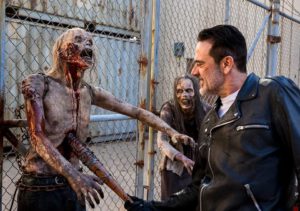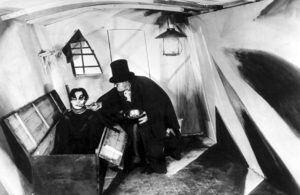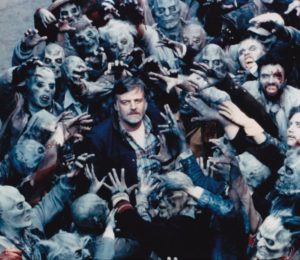Monster fiction, like all fiction, reveals more about the real-world fears of the writer than the artificial fears from the plot. We see this again and again in monsters that rise and fall from prominence like seasons: vampires, with their implied threats of toxic, and ultimately enslaving sexuality; the born and reborn, like Frankenstein’s monster, a fable that speaks to the heart of all parents who need to wonder if the life they are bringing into this world will save or destroy it and, if the latter, was it love or arrogance that made this happen; and also werewolves, the fear of reverting to a primal, uncontrollable ancestral version of ourselves, easily commandeered and conquered by the natural world.
But as we’ve seen over the past decade or so, when the sex gets domestic and boring, your kids are little beasts but no more beastly than anyone elses’, and your destructive tendencies toward the moonlight are quickly quelled by Ambien, one monster seems to hang in there. Their archetype probably should have passed a thousand times over, but like the beasts themselves, they keep coming back to prey upon the minds (brains) of the living.
 In that, the zombie is nearly as potent a political metaphor as any we encounter.
In that, the zombie is nearly as potent a political metaphor as any we encounter.
When you think about it, that notion of the insidious disease, curse, or spell that befalls someone close to you to turn them so fully against you – to the point where they blindly see you, the former loved one, as cattle to be slaughtered and devoured – encapsulates prevailing paranoias that run rampant not on AMC, but on 24-hour news channels. It feeds the anxiety beast that tells you, “your own have been infiltrated.”
The zombie has had a long history of disturbing the peaceful slumbers of fiction consumers, from the less graphic confines of stories of hypnotized mental slaves such as 1920’s The Cabinet of Dr. Caligari, to the extremely graphic world proffered by George Romero in his “Living Dead” movies, wherein modern sins like consumerism, war and its profiteering, and the like are brutally satirized to drive home the point of rampant mindlessness. The conclusions tend to be the same. If you do not use the mind you have been given, you will lose it, either to insanity or to a familiar willing to eat it like a gory stew.
 But I am prone to wonder, in this day and age, if we’ve taken the story too far. It has become extremely easy, and very tempting, to identify and vilify “the other.” We no longer need to see the rotting, shambling flesh to fear the monster inside of those around us, even those close to us, and to then be comfortable with rejecting their humanity.
But I am prone to wonder, in this day and age, if we’ve taken the story too far. It has become extremely easy, and very tempting, to identify and vilify “the other.” We no longer need to see the rotting, shambling flesh to fear the monster inside of those around us, even those close to us, and to then be comfortable with rejecting their humanity.
We need parables to help us understand the times in which we live. We also need escapism to forget about the worst of those times, and somewhere in the middle these two mix and, quite often, give us something brilliant, insightful, and yes, sometimes terrifying. It’s when we phase out the power of the parable, giving all that power to the escapism, where we get into trouble. That’s when we get into easy solutions and justifications of good versus evil.
 I’m not suggesting that, when we see those around us who reflect psychologies and philosophies that we disagree with, we should not feel repulsion to those tendencies. I think a lot of the bad state we’re currently in is precisely because we saw awfulness and chose to ignore it. Likewise, I’m not suggesting that AMC should cancel its zombie shows, or movie-makers should stop making zombie movies, even if the format feels well-worn and threadbare by now.
I’m not suggesting that, when we see those around us who reflect psychologies and philosophies that we disagree with, we should not feel repulsion to those tendencies. I think a lot of the bad state we’re currently in is precisely because we saw awfulness and chose to ignore it. Likewise, I’m not suggesting that AMC should cancel its zombie shows, or movie-makers should stop making zombie movies, even if the format feels well-worn and threadbare by now.
What I am suggesting is that we need to look deeper into the allegorical nature of the stories again and, perhaps, rather than retreating to the inherent tribalism of “us versus them” and “kill or become (or be killed),” we should be conducting our behavior in such a way that the zombie trope starts to lose its allure, rather than adding to it year upon year.
If our monsters, and the monsters we gravitate to at any given time, are particularly reflective of who we are as a culture, our continued attraction to zombies says very scary things about us today.





Comments